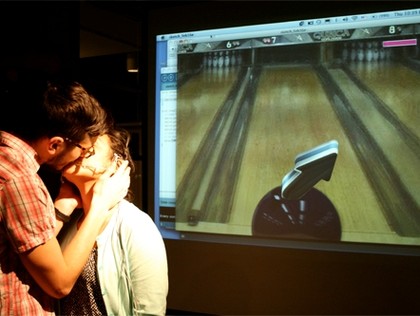The robot that can tell if you're drunk by touching you
Air lasers, digital skin and tiny running robots

Sign up for breaking news, reviews, opinion, top tech deals, and more.
You are now subscribed
Your newsletter sign-up was successful
Imagine a robot hand that could touch you and immediately tell what diseases you've got, or a robot cop that could tell how drunk you were with a single tap.
Stanford university researcher Professor Zhenan Bao is helping build it: she's working on so-called super skin - ultra-sensitive, solar-powered electronic skin that can detect the lightest touch and, one day, detect the tiniest chemical traces in a drop of liquid.
Bao's team has already developed one of the key technologies: a flexible organic transistor that can detect certain kinds of DNA.
Arms race
Ever wanted to experience having three arms, two heads or eighteen legs? Until recently that was deemed impossible, because our brains don't understand the concept of having more than two arms, two legs or one head.
However, new research can make us "feel" more limbs than we actually have - and can even make us flinch if a fake limb is threatened with a knife. Brain scientists at Karolinska Institute have demonstrated that it's possible to "create an illusion of owning three arms".
THAT'S HANDY: You know it's fake. We know it's fake. But the subject's brain thinks it's real
Sign up for breaking news, reviews, opinion, top tech deals, and more.
The implications for medical prosthetics are profound. "It may be possible in the future to offer a stroke patient... a prosthetic arm that can be used and experienced as his own," study head Henrik Ehrsson says.
Lasers that sniff out stuff
Lasers. Is there anything they can't do? Apparently not: according to Discovery News, a group at Princeton University has created an "air laser", which can warn of the presence of dangerous chemicals.
The trick is to excite oxygen molecules, possibly by showing them pictures of lady oxygen molecules, until they get so excited they release energy in the form of photons.
Mirrors focus the photons into a beam of light "similar to the way a magnifying glass focuses sunlight"; when it reaches its destination it creates a new beam that travels in the opposite direction.

SHINE ON: If the air laser was visible, which it isn't, it might look like this. Or something [credit: Wikimedia]
By comparing the incoming beam to the outgoing one, scientists can see if there are any chemical differences. The point of all this? Laser beams that can spot gas leaks, chemical contaminants and possibly even unexploded bombs.
Run robot run robot run run run
Ever wished robots would do something stupid for our amusement? Good news! The first ever robot marathon is under way in - where else? - Japan.
Sadly our visions of giant mechs stomping their way through downtown Tokyo were a bit ambitious: the five contestants in the inaugural Robo Mara are all around a foot high, which means it'd be a struggle for them to destroy downtown Toytown.

MARATHON MEN: This is Black Ox, from Robo Mara creator Vstone. The "runners" look nothing like this
Because their legs are so little, the robots are expected to take around four days to complete the race.
A load of bowls
If you've ever been kissing someone gorgeous and thought "man, I wish all this sexual energy could be used to control a fairly rubbish game of bowls" then you'll be delighted by the latest evidence that humanity has got way too much time on its hands.
The Kiss Controller is exactly what the name suggests: a way of controlling a computer game by kissing. As co-creator Hye Yeon Nam explains: "one person has a magnet on his/her tongue and the other person wears the headset.
While they kiss, the person who has the magnet on his/her tongue, controls the direction and speed of the bowling ball for 20 seconds." Fun AND sexy!

KISSY KISSY: Is it just us, or is this picture just dying to be in a caption competition? [Image credit: Hye Yeon Nam]

Contributor
Writer, broadcaster, musician and kitchen gadget obsessive Carrie Marshall has been writing about tech since 1998, contributing sage advice and odd opinions to all kinds of magazines and websites as well as writing more than twenty books. Her latest, a love letter to music titled Small Town Joy, is on sale now. She is the singer in spectacularly obscure Glaswegian rock band Unquiet Mind.